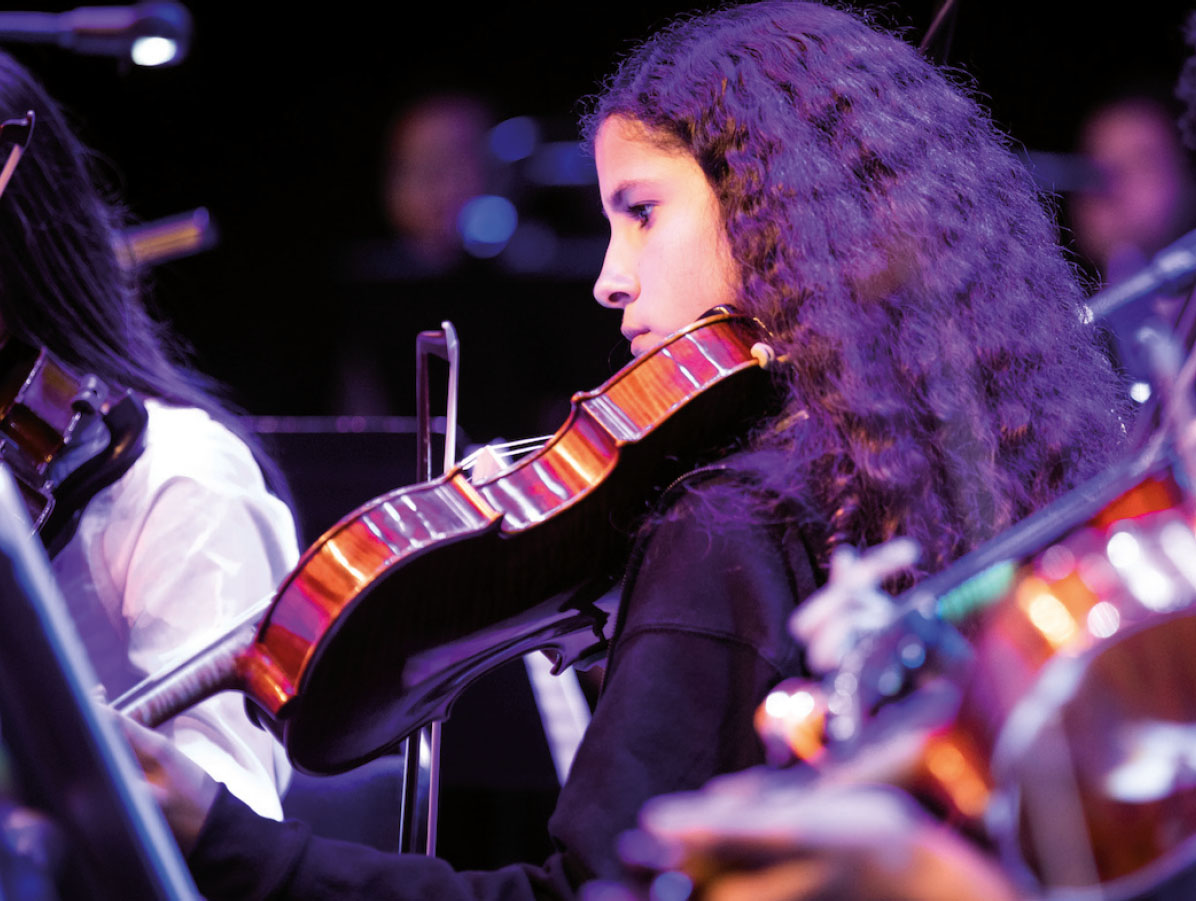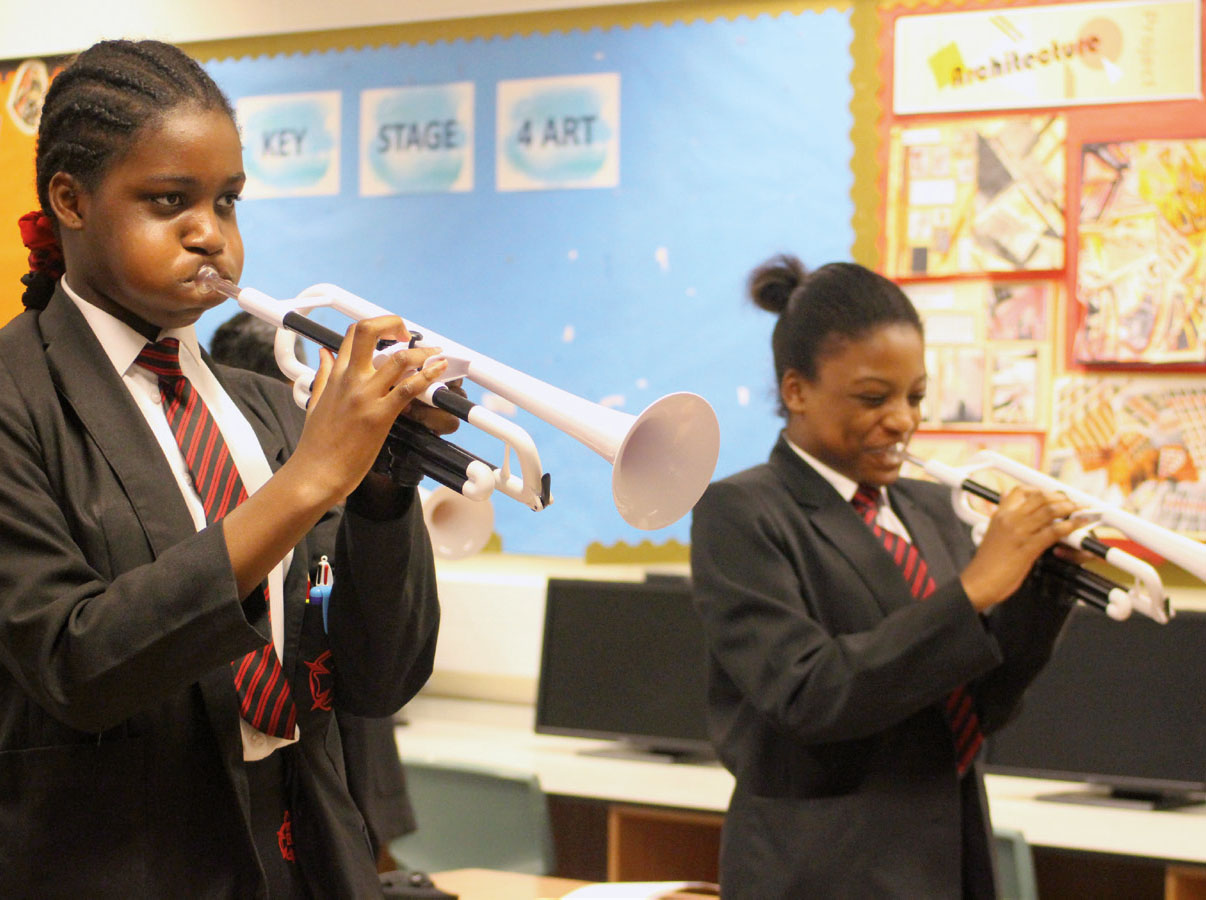
‘When I began at secondary school, I was a shy 11-year-old. I never put my hand up. I didn't believe in myself. Music has given me confidence that I can achieve; it has had a remarkable impact on how I conduct myself in other parts of my life.’ This is a testimony from Deronne White, a student turned charity ambassador who was given the opportunity to learn the flute through Music in Secondary Schools Trust (MiSST). Since then, White has gone on to be principal piccolo of the National Youth Orchestra of Great Britain (NYO), a Royal College of Music graduate, and a flautist in Chineke! Orchestra.
It is widely acknowledged that there continues to be inconsistent music provision across England, with children in some areas receiving little to no in-school music, and A Level and GCSE Music entries dwindling. The cross-curricular and holistic benefits of music are also widely acknowledged, especially in the wake of the pandemic, but how can we tap into these for every child who wants them, regardless of their financial situation? Taking the matter into its own hands is MiSST – a charity that is currently working with 26 schools across England to offer musical training to students who otherwise might not be able to afford it.
‘Children should get the same education opportunities, regardless of where they live and where they go to school – we all know that. We are trying to address that problem through music,’ says Rachel Landon, CEO of MiSST. She knows all about the challenges schools face, having previously worked as a teacher, becoming a senior leader at Highbury Grove School in Islington for a number of years, which is where MiSST was born. ‘Our vision at MiSST is to help transform the lives of children in disadvantaged schools through music education,’ she says.
 A MiSST student rehearsing. Courtesy MiSST
A MiSST student rehearsing. Courtesy MiSST
How MiSST works
The charity has two branches:
- It aims to provide funding to schools in disadvantaged communities and enable all students as they enter their secondary school to be given a classical musical instrument along with regular group tuition and the chance to perform.
- It aims to improve the quality of teaching, learning, and leadership of music through offering CPD and high-quality staff training. The trust wants to support educators to increase their knowledge, understanding, and skills, enabling schools to have the tools to develop the programme further.
The two prongs of MiSST's work undoubtedly feed off each other in a symbiotic relationship, and both elements are fundamental to ensuring the longevity of its programmes. So far, the trust has reached over 19,000 children, and has over 10,000 children on its programme this year. The students involved will have a minimum of three years tuition during curriculum time, funded through philanthropy.
The trust's work is not just designed to support students – high quality teaching is at the top of the agenda. ‘A robust curriculum and high-quality resources are essential, but without having high-quality teaching to implement the plans, the plans aren't really worth the paper that they are written on,’ says Landon. ‘It is sort of like pouring water into a chocolate teapot and expecting a good cup of tea. You need to know your plans can be put into fruition and the teaching has to be high quality.’
How MiSST was born
Before the charity existed, its founder Truda White MBE was working in an (at the time) failing inner city secondary school in London – Highbury Grove School – and had heard about a strings programme in New York that was giving children in ‘challenging circumstances’ the opportunity to have instrumental teaching. With help from the Charles Wolfson Charitable Trust, she implemented the scheme in her school, giving every Key Stage 3 child a classical instrument, and helping them follow a progressive and diverse curriculum, supported by high-quality teaching for a minimum of three years.
The lessons were group lessons delivered by the school's music teachers supported by instrumental tutors. They also provided half-price tuition for some students in KS4 and 5 who chose GCSE Music and A Levels. ‘I do think it is important to note that the model was never about creating amazing musicians, although that was often the outcome,’ says Landon. ‘It was really about the music behind this vehicle for transformation in a failing school, and it was about equipping students with responsibility and communication skills.’
The school moved positively in a few years, and then in 2010 became an ‘outstanding school’ – in particular, Ofsted noted the outstanding extra provision offered in music. ‘I was a senior leader there at the time, and it was clear to me how much music being at the heart of the school impacted the outcomes for pupils. There was never a moment where music wasn't being played somewhere on campus,’ Landon says.
Financial support
In 2012, Andrew Lloyd Webber mentioned the school in the House of Lords in relation to the impact that music and arts provision can have, leading White and the team at Highbury Grove to put in a funding application to the Andrew Lloyd Webber programme to extend their scheme beyond the school. Lloyd Webber recently said: ‘Everyone in this country, particularly those from disadvantaged backgrounds, should be able to participate and I am thrilled MiSST's music programme will make the difference for these young people. I know it works. Headteachers and the staff in MiSST's partner schools know it works. It has been proven to be the common denominator in schools where often over 60 languages are spoken.’
After gaining the funding, the Music in Secondary Schools Trust was launched in April 2013, fuelled by the belief that children and young people's lives can be transformed through high-quality music. ‘The goal is to make sure that all children are offered an amazing music education, and it's not just children who can afford to play music, because that is not fair,’ Landon reiterates.
Now, the trust has gained another third-donor partnership with the Dame Alice Owen Foundation and has a number of school partnerships all over England, targeting areas of particular need such as Oldham, Middlesbrough, Cumbria, Yorkshire, Bournemouth and Dorset. It has a star-studded list of trustees such as Lady Lloyd Webber, Daniel Peltz and Kadiatu Kanneh-Mason, and its patrons include Nicola Benedetti and Jess Gillam.

Evaluating the future and celebrating the past
In its 10th year, the charity is sustaining its partnerships and the impact it has in schools. Alongside this, MiSST aims to reach more areas of need across the country and support more schools that deem music as an essential part of the curriculum. Moving forward, the trust plans on increasing its levels of CPD available for music teachers and instrumental tutors so that they can deliver the highest quality music provision possible. Even during the pandemic, the charity was still offering resources to students and teachers, replacing its MiSST Together programme with MiSST Together at Home, providing tutorial videos of music leaders and culminating in a virtual concert of Mambo No. 5. The team has also created 350 video lessons that students can use when they are learning from home, alongside resources, in-person conferences, residentials for students, and CPD forums for music leaders.
On 24 April 2023, MiSST will be hosting its 10th anniversary concert at Theatre Royal, Drury Lane, to celebrate a decade of work. The event will host a number of classical music stars – including Andrew Lloyd Webber and the Kanneh-Mason family – and a number of MiSST alumni.
MiSST Academy
Landon is keen to share some of MiSST's most recent developments. Initially functioning as a Saturday music school, the MiSST Academy has now been launched in London. Modelled on a UK Junior Conservatoire, the Academy is free for all MiSST students who want to attend and still runs on Saturdays. The Academy has a large Symphony Orchestra, a Training Orchestra, and a MiSST Leaders Orchestra where the students have a say on the way they want to perform – for example, they could perform standing up or compose their own piece. There they also run a MiSST Music GCSE for students whose schools don't offer the qualification, and offer courses on wellbeing, conducting, composition, youth chamber music and more.
This year, in line with the charity's aim to build equity of provision outside of London, different pathways for students across the country are also being built. MiSST offers Specialist Schools of Music to those in rural areas, meaning that students can attend further music tuition after school, often working with endangered instruments or developing their skills in ensembles or orchestras.
Since the release of the NPME, MiSST has seen a spike in more schools applying to work with the charity and set up music clubs for their students, but each one is different, the CEO tells me. ‘We are really aware that schools are all different, so we offer bespoke pathways to each institution to ensure more musical opportunities for the students,’ says Landon.
A bigger invisible impact
One of MiSST's students, Ricardo, has just achieved Grade 8 flute with distinction and now wants to go to university to study music and composition, crediting the programme with helping him find his passion for the instrument. ‘Even though students do go on to study music – sometimes at Oxford of Cambridge – the scheme is ultimately about gaining different skills through music. It is about becoming well-rounded students, and I can't emphasise that enough,’ says Landon.
MiSST produces an annual progress report, and the volume of positive feedback from parents, children, and teachers is staggering. Prioritising schools with high pupil premium levels, those with lower Ofsted ratings, and deficit budget models, MiSST has countless examples of schools being turned around through investing in a long-term programme and the purchasing of musical instruments.
While the success stories are brilliant to read, there are millions of invisible impacts of MiSST's work across the country – things that we can't measure or pinpoint, but impressions large and small on children and their relationship with music. Schemes like this are so powerful because, as shown by the Highbury Grove School case study, their impacts transcend the music department and seep into everyday life in the best possible way. The continued call for resources to extend equal musical opportunities to all has never been more important.




